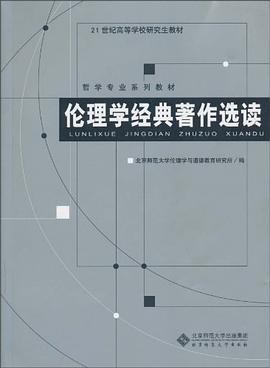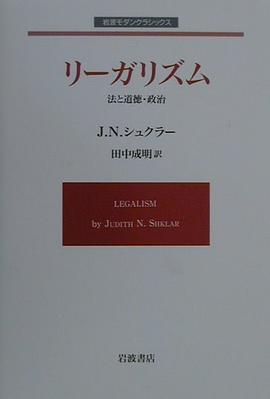

具体描述
While many recent observers have accused American judges - especially Supreme Court justices - of being too driven by politics and ideology, others have argued that judges are justified in using their positions to advance personal views. Advocating a different approach - one that eschews ideology but still values personal perspective - H. Jefferson Powell makes a compelling case for the centrality of individual conscience in constitutional decision making.Powell argues that almost every controversial decision has more than one constitutionally defensible resolution. In such cases, he goes on to contend, the language and ideals of the Constitution require judges to decide in good faith, exercising what Powell calls the constitutional virtues: candor, intellectual honesty, humility about the limits of constitutional adjudication, and willingness to admit that they do not have all the answers. "Constitutional Conscience" concludes that the need for these qualities in judges - as well as lawyers and citizens - is implicit in our constitutional practices, and that without them judicial review would forfeit both its own integrity and the credibility of the courts themselves.
作者简介
目录信息
读后感
评分
评分
评分
评分
用户评价
我对《Constitutional Conscience》的评价,只能用“震撼”二字来形容。这本书不仅仅是一部关于宪法的著作,更像是一份关于人类文明与社会秩序的深度剖析。作者以一种宏大的历史视野,将不同文明、不同时代背景下的宪法实践进行对比分析,揭示了普适性的宪法原则是如何在各自的文化土壤中生根发芽,又如何在历史的长河中不断演变。我印象最深刻的是,书中对“集体记忆”与“个体意识”在宪法制定和执行中的作用的探讨。作者认为,一个国家的宪法,不仅仅是法律条文的集合,更是其国民集体记忆的载体,承载着民族的价值观、历史的经验教训以及对未来的期盼。而个体意识,则是宪法精神得以传承和发展的根本动力。这种将宏大叙事与个体关怀相结合的视角,让这本书充满了人文温度。书中对于“权力边界”的界定,也让我受益匪浅。作者深入剖析了权力是如何产生、如何扩张、又如何可能被滥用的,并提出了多种制衡和监督权力的机制。这种对权力的审慎态度,对于我们这些普通公民来说,具有极强的警示意义。它提醒我们,必须时刻保持警惕,确保权力始终在法律的框架内运行,服务于人民的福祉,而不是成为压迫和剥削的工具。这本书的语言风格变化多端,时而如行云流水,时而又如惊涛拍岸,总能在不经意间触动你内心最深处的情感。
评分对于《Constitutional Conscience》这本书,我只能用“醍醐灌顶”来形容我的感受。它彻底颠覆了我过去对宪法的一些刻板印象,让我认识到,宪法远不止是冰冷的法律条文,它更是一种活生生的、不断演变的社会精神。作者在书中对“宪法文化”的构建与传承进行了深入的探讨。他认为,一个健全的宪法体系,不仅需要有完备的法律制度,更需要一种根植于社会大众心中的宪法文化,一种对宪法原则的普遍认同和尊重。这种文化,是通过教育、媒体、以及日常的社会互动等多种途径逐渐形成的。我特别欣赏作者对“例外状态”的批判性分析。他揭示了在紧急情况下,权力边界是如何轻易被突破,而公民权利又是如何在不经意间被侵蚀的。这种对权力的警惕,以及对公民权利的坚定捍卫,是这本书的核心精神之一。书中对那些为了捍卫宪法原则而付出巨大代价的普通人的故事的描绘,更是让我肃然起敬。他们用自己的行动,诠释了“宪法良知”的真正含义,也为我们树立了榜样。这本书的语言风格十分别致,它不像是一本严肃的学术论著,反而更像是一位智者在与你娓娓道来,用一种平易近人的方式,引导你思考那些深奥的政治哲学问题。它让我开始审视自己,作为一名公民,我是否真正理解了宪法赋予我的权利,又是否尽到了我应尽的义务。
评分这本《Constitutional Conscience》着实是一本引人深思的书,我最近有幸拜读,期间的感受犹如在历史的长河中泛舟,时而惊涛骇浪,时而风平浪静。它不仅仅是一部关于宪法的著作,更像是在探讨一种深植于公民灵魂深处的道德指南针。读罢掩卷,我脑海中反复回荡的是那些关于权利与责任的辩论,关于个体自由与集体福祉的平衡,以及一个社会如何在纷繁复杂的价值体系中寻求共识。作者以一种极其审慎的态度,剖析了宪法精神的演变,从它最初的诞生,到如今在现代社会中面临的种种挑战,每一步都充满了历史的厚重感和现实的紧迫感。书中对不同历史时期发生的重大宪法事件的解读,如同一幅幅生动的历史画卷,让我得以身临其境地感受那些关键时刻的决策是如何塑造了我们今天的社会结构。更让我印象深刻的是,作者并没有止步于对历史的梳理,而是将目光投向了未来,对于人工智能、全球化等新兴议题对宪法原则的潜在影响进行了深刻的探讨,这无疑为我们这些普通读者打开了全新的思考维度。每一次阅读,都会有新的感悟,仿佛与作者进行了一场跨越时空的对话,也促使我更加审视自身在社会中所扮演的角色,以及我们作为公民应该如何践行那份沉甸甸的“宪法良知”。这本书的价值,在于它引导我们去思考,去质疑,去不断地追求一个更公正、更自由、更具人文关怀的社会。它提醒我们,宪法不仅仅是一纸条文,更是凝聚了无数先辈智慧与牺牲的精神象征,是我们通往更美好未来的基石。
评分我必须承认,《Constitutional Conscience》这本书给了我一种前所未有的阅读体验,它并非那种轻易就能一口气读完的畅销读物,而更像是需要细细品味、反复咀嚼的哲学著作。作者在字里行间所展现出的广博学识和深刻洞察力,让我一次又一次地停下来,陷入沉思。他对抽象概念的具象化处理,将那些看似遥不可及的政治哲学理论,通过生动的故事和精辟的分析,变得触手可及。我尤其被书中关于“多数人的暴政”与“少数人的权利”之间的张力分析所吸引。作者并没有简单地站队,而是试图在两者之间找到一种动态的平衡,探讨如何在保障集体意志的同时,也能够充分尊重和保护个体的基本权利,即使这些权利不被大多数人所认同。这种 nuanced 的视角,在当下信息碎片化、观点极化严重的社会环境中,显得尤为珍贵。书中关于司法审查的讨论,也让我大开眼界,理解了法官在解释和适用宪法时所面临的复杂困境,以及他们如何试图在维护宪法原则的稳定性和适应社会变迁的需求之间取得平衡。每一次阅读,我都会尝试从不同的角度去理解作者的论证,有时会跟随他深入历史的肌理,有时又会跟随他一同展望科技浪潮下的社会伦理挑战。这本书的魅力在于它的开放性,它并不提供简单的答案,而是不断抛出问题,激发读者自己去寻找答案,去形成自己的判断。这种互动式的阅读体验,让我感觉自己不仅仅是一个读者,更是一个积极的参与者,共同参与到这场关于宪法精神的探索之中。
评分《Constitutional Conscience》这本书,无疑是近期我读过的最令人心潮澎湃的读物之一。它以一种非常独特的方式,将宪法学、政治哲学、历史学以及社会心理学融为一体,构建了一个关于“宪法良知”的宏大理论框架。作者并没有像许多法学著作那样,拘泥于条文的解释和判例的分析,而是将焦点放在了更加抽象但却至关重要的“宪法精神”上。我特别喜欢书中关于“无声的契约”这一概念的阐述。作者认为,宪法不仅仅是政府与公民之间的正式契约,更是一种弥漫在社会空气中的、无形的、由共同价值观和行为准则所构成的“无声的契约”。这种契约的存在,是社会秩序得以维持、公民权利得以保障的基石。一旦这种无声的契约被破坏,即使有再完善的法律条文,也难以避免社会走向混乱。书中对历史上那些伟大的宪法改革者和激进分子事迹的描绘,更是让我深感振奋。他们并非仅仅是出于对法律条文的遵从,而是源于内心深处对正义与自由的强烈渴望,这种“宪法良知”驱使他们去挑战不公,去推动社会的进步。这本书的叙事方式非常吸引人,作者善于运用故事和案例来阐释复杂的理论,使得阅读过程充满了探索的乐趣。每一次翻开这本书,我都会感觉自己仿佛置身于一场思想的盛宴,与历史上的智者进行着深刻的对话,也促使我对“公民”的含义有了更深的理解。
评分《Constitutional Conscience》这本书,可以说是一场关于公民责任与社会契约的深刻洗礼。我一直对政治哲学和法律体系有着浓厚的兴趣,但这本书所提供的视角,无疑是独树一帜的。作者以一种近乎考古的严谨,深入挖掘了宪法精神在不同文化语境下的演变轨迹,并将其与当代的社会挑战巧妙地结合。我尤其欣赏他对于“默许”在宪法实践中的作用的探讨,以及这种无意识的服从是如何潜移默化地塑造着我们的法律认知和行为模式。书中对公民不服从的案例分析,更是让我对“良知”的界限和“抵抗”的意义有了全新的认识。作者并没有简单地鼓吹反抗,而是试图在个人良知与法律秩序之间划定一条清晰的界线,并探讨如何在两者之间找到一个可持续的共存之道。这种平衡的智慧,在当今社会显得尤为重要,尤其是在面对一些有争议的法律条文或政策时,我们更需要思考,我们的行动究竟是源于对更高级道德原则的坚守,还是仅仅出于对现有秩序的挑战。这本书的语言风格非常独特,既有学术著作的严谨,又不乏文学作品的感染力,使得即使是复杂的政治理论,也能被描绘得生动形象,引人入胜。读这本书,就像是与一位睿智的长者进行对话,他循循善诱,引导你去看透表象,直达事物的本质。它促使我反思,作为一个社会的一份子,我们应该以怎样的姿态去面对法律,去参与公共事务,去践行那份属于我们每个人的“宪法良知”。
评分《Constitutional Conscience》这本书,可以说是我近期阅读中最具启发性的一部作品。它以一种非常独特的方式,将宪法精神与个体道德紧密联系起来,探讨了“宪法良知”是如何成为一个社会健康运行的基石。作者在书中对“权力腐蚀”这一现象进行了深入的剖析,并提出了多种应对机制。他认为,权力本身具有扩张的倾向,而唯有健全的宪法制度和高度的公民意识,才能有效地对其进行约束。我特别欣赏书中关于“沉默的共谋”的论述。作者指出,当公民对不公的法律或政策保持沉默时,他们实际上是在无意识地助长了权力的扩张,从而破坏了宪法的精神。这种对公民责任的强调,让我深感责任重大。书中对那些敢于发声、敢于挑战不公的普通人的事迹的描绘,更是让我热血沸腾。他们用自己的行动,诠释了“宪法良知”的真正力量。这本书的叙事方式,可以说是引人入胜,又不乏深度。作者善于运用故事和案例来阐释复杂的理论,使得阅读过程充满了探索的乐趣。它让我开始反思,我是否仅仅满足于做一个被动的社会成员,还是应该主动去学习、去思考、去践行属于我自己的“宪法良知”。
评分《Constitutional Conscience》这本书,无疑为我打开了一扇全新的视角,让我重新审视了“宪法”在社会中的真正意义。它并非仅仅是一堆冰冷的法律条文,而是一种渗透到社会肌理中的精神力量,一种对公平、正义和自由的永恒追求。作者以其深厚的学识和独特的洞察力,将宪法学、政治哲学以及历史学巧妙地融合在一起,构建了一个关于“宪法良知”的宏大理论体系。我被书中对于“法律的局限性”的探讨深深吸引。作者并没有夸大法律的作用,而是清醒地认识到,即使是最完善的法律,也无法解决所有社会问题。真正能够弥合社会裂痕、促进社会进步的,是根植于公民内心的“宪法良知”。书中对那些在历史关键时刻,为了捍卫宪法原则而挺身而出的普通人的事迹的描绘,更是让我肃然起敬。他们用自己的行动,诠释了“宪法良知”的真正价值,也为我们树立了榜样。这本书的语言风格,可以说是既有学术著作的严谨,又不乏文学作品的感染力,使得即使是复杂的政治理论,也能被描绘得生动形象,引人入胜。它让我开始审视,我是否仅仅生活在法律之下,还是真正理解并践行着宪法所倡导的精神。
评分《Constitutional Conscience》这本书,带给我一种前所未有的阅读冲击。它不仅仅是一部关于宪法的著作,更像是一场关于“社会责任”的深刻启蒙。作者以一种极其审慎的态度,深入探讨了宪法原则如何在不断变化的社会现实中得以体现和维护。他并没有将宪法视为一成不变的文本,而是将其视为一种活态的、需要不断被理解和践行的精神。我被书中关于“集体失忆”与“历史重塑”之间微妙关系的论述所深深吸引。作者认为,如果一个社会失去了对自身历史的清醒认识,那么它就容易在未来的道路上重蹈覆辙。而“宪法良知”的传承,恰恰需要建立在对历史的深刻反思之上。书中对那些试图通过操控法律来实现个人或集团利益的案例分析,更是让我警醒。它提醒我们,必须时刻警惕那些打着法律旗号,实则破坏宪法精神的企图。这种对权力的审视,以及对法治精神的坚定捍卫,是这本书的核心价值所在。这本书的语言风格,可以说是既有学者的严谨,又不乏哲学家的深刻。作者善于运用比喻和象征,将抽象的概念变得生动形象,引发读者深入的思考。它让我开始审视,我是否只是一个生活在社会中的个体,还是一个主动承担社会责任的“公民”。
评分《Constitutional Conscience》这本书,在我看来,是一部关于“公民意识觉醒”的教科书。它并没有直接教授你法律条文,而是通过对历史事件、哲学思想以及社会现象的深刻剖析,引导读者去思考,去认识到公民在社会结构中所扮演的独特而重要的角色。作者在书中对“宪法记忆”的传承进行了详尽的论述。他认为,一个国家的宪法,是其历史的凝结,是过去经验教训的总结,更是对未来的承诺。而这种“宪法记忆”的传承,需要每一代公民的参与和努力,才能确保宪法精神的活力不衰。我尤其被书中关于“沉默的大多数”如何影响宪法走向的分析所吸引。作者认为,虽然历史的进程往往由少数精英推动,但最终决定宪法命运的,是广大民众的态度和选择。这种对民众力量的肯定,让我感到振奋,也让我认识到,我们每一个普通人,都有能力去影响社会的走向。书中对那些被遗忘的、却为宪法进步做出过贡献的人物事迹的挖掘,更是让我深感敬佩。他们用自己的智慧和勇气,为我们奠定了今天的基石。这本书的写作风格,可以说是行云流水,又不乏深度。作者善于将宏大的理论问题,拆解成一个个具体的、 relatable 的故事,使得阅读过程轻松而富有启发。它让我开始反思,我是否仅仅满足于做一个被动的接受者,还是应该主动去学习、去思考、去践行属于我自己的“宪法良知”。
评分 评分 评分 评分 评分相关图书
本站所有内容均为互联网搜索引擎提供的公开搜索信息,本站不存储任何数据与内容,任何内容与数据均与本站无关,如有需要请联系相关搜索引擎包括但不限于百度,google,bing,sogou 等
© 2026 book.wenda123.org All Rights Reserved. 图书目录大全 版权所有




















